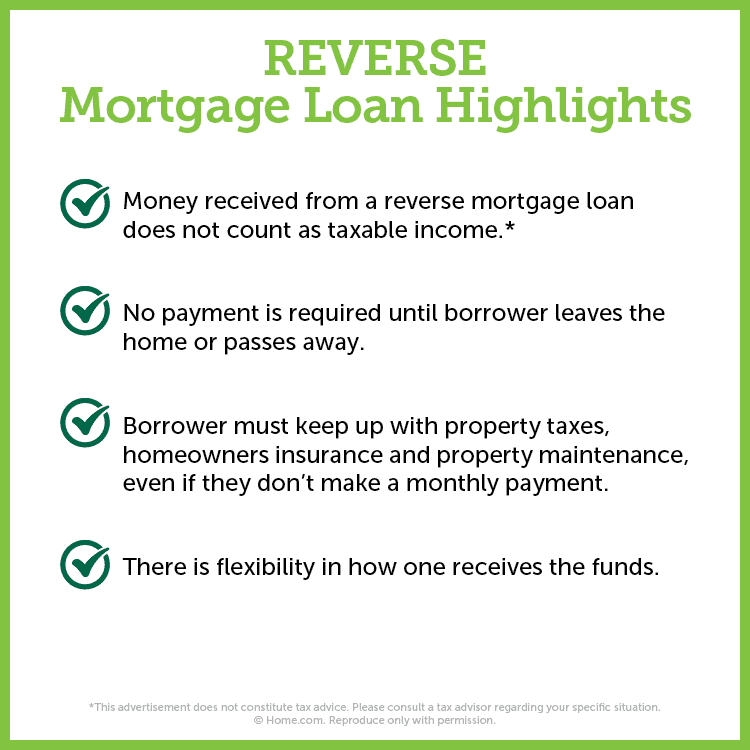A Guide to Help You Purchase Reverse Mortgage for Your Retirement Plan
A Guide to Help You Purchase Reverse Mortgage for Your Retirement Plan
Blog Article
Unlock Financial Liberty: Your Guide to Investing In a Reverse Mortgage
Recognizing the details of reverse home mortgages is essential for homeowners aged 62 and older seeking economic liberty. As you consider this alternative, it is vital to comprehend not only how it functions yet likewise the ramifications it may have on your financial future.
What Is a Reverse Home Mortgage?

The fundamental charm of a reverse home mortgage lies in its possible to enhance monetary adaptability during retired life. Home owners can utilize the funds for different objectives, including medical expenditures, home improvements, or daily living expenses, therefore giving a security net during a critical point of life.
It is important to understand that while a reverse home loan enables raised cash flow, it likewise reduces the equity in the home with time. As interest builds up on the impressive loan balance, it is important for prospective debtors to meticulously consider their long-lasting monetary strategies. Consulting with an economic consultant or a reverse home mortgage specialist can provide important insights into whether this option straightens with an individual's financial objectives and circumstances.
Eligibility Needs
Recognizing the qualification needs for a reverse home mortgage is crucial for home owners considering this economic alternative. To certify, applicants should be at the very least 62 years of ages, as this age requirement enables seniors to access home equity without monthly home mortgage repayments. Furthermore, the property owner should occupy the house as their main home, which can include single-family homes, particular condos, and produced homes meeting details standards.
Equity in the home is one more vital need; house owners typically need to have a substantial amount of equity, which can be identified via an evaluation. The amount of equity offered will directly affect the reverse home loan quantity. Moreover, applicants have to demonstrate the capacity to preserve the home, including covering home tax obligations, house owners insurance coverage, and upkeep expenses, ensuring the residential property remains in excellent condition.
In addition, potential debtors have to go through a financial evaluation to review their income, debt history, and general monetary scenario. This assessment aids lenders figure out the candidate's capacity to meet ongoing responsibilities connected to the property. Meeting these demands is vital for safeguarding a reverse home mortgage and ensuring a smooth financial shift.
Benefits of Reverse Home Loans
Many advantages make reverse home mortgages an enticing alternative for elders aiming to boost their economic adaptability. purchase reverse mortgage. Among the key benefits is the capacity to transform home equity right into money without the requirement for regular monthly home loan repayments. This feature permits seniors to access funds for numerous demands, such as clinical costs, home enhancements, or daily living expenses, thus reducing monetary tension
Additionally, reverse mortgages provide a safety web; elders can remain to live in their homes for as lengthy as they satisfy the funding demands, fostering security throughout retirement. The proceeds from a reverse home mortgage can likewise be used to postpone Social Safety benefits, possibly leading to higher payments later.
Furthermore, reverse home mortgages are non-recourse financings, suggesting that debtors will never ever owe greater than the home's worth at the time of sale, try these out safeguarding them and their heirs from monetary liability. The funds obtained from a reverse mortgage are usually tax-free, adding an additional layer of financial alleviation. Overall, these advantages placement reverse home loans as a practical service for elders seeking to enhance their financial circumstance while go to the website keeping their cherished home atmosphere.

Charges and expenses Entailed
When considering a reverse home loan, it's necessary to understand the various expenses and charges that can influence the total economic photo. Comprehending these expenditures is essential for making a notified choice regarding whether this economic item is appropriate for you.
Among the key costs associated with a reverse mortgage is the origination cost, which can vary by lender but generally ranges from 0.5% to 2% of the home's appraised value. Additionally, homeowners ought to anticipate closing costs, which may consist of title insurance policy, assessment costs, and credit score record fees, typically amounting to a number of thousand dollars.
One more considerable cost is home loan insurance coverage premiums (MIP), which secure the loan provider against losses. This fee is usually 2% of the home's value at closing, with a recurring yearly premium of 0.5% of the remaining lending equilibrium.
Last but not least, it is very important to consider ongoing prices, such as property tax obligations, house owner's insurance coverage, and upkeep, as the debtor stays responsible for these expenditures. By thoroughly evaluating these fees and prices, home owners can better examine the financial effects of pursuing a reverse home loan.
Steps to Start
Getting going with a reverse home mortgage involves a number of key actions that can help enhance the process and ensure you make educated decisions. First, analyze your financial circumstance and identify if a reverse home mortgage aligns with your long-lasting objectives. This includes assessing your home equity, present financial debts, and the necessity for extra revenue.
Following, research various loan providers and reference their offerings. Seek trusted establishments with favorable testimonials, transparent fee structures, and competitive rates of interest. It's necessary to contrast terms to find the very best fit for your needs.
After choosing a loan provider, you'll need to complete a comprehensive application process, which normally needs paperwork of earnings, possessions, and property details. Take part in a therapy session with a HUD-approved therapist, that will certainly supply understandings into the ramifications and obligations of a reverse mortgage.
Conclusion
In conclusion, reverse mortgages provide a viable choice for senior citizens looking for to enhance their economic security throughout retired life. By transforming home equity into obtainable funds, home owners aged 62 and older can address various monetary needs without the stress of monthly repayments.
Understanding the complexities of reverse home mortgages is vital for homeowners aged 62 and older looking for economic freedom.A reverse home loan is a monetary item made primarily for home owners aged 62 and older, permitting them to transform a portion of their home equity into money - purchase reverse mortgage. Consulting with a reverse home mortgage or a financial consultant professional can provide useful understandings into whether this option lines up with a person's economic goals and situations
Additionally, reverse home loans are non-recourse lendings, indicating that debtors will certainly never ever owe even more than the home's value at the time of sale, safeguarding them and their successors from economic liability. In general, these benefits setting reverse home loans as a functional option for elders looking for to boost their economic scenario while keeping their valued home setting.
Report this page